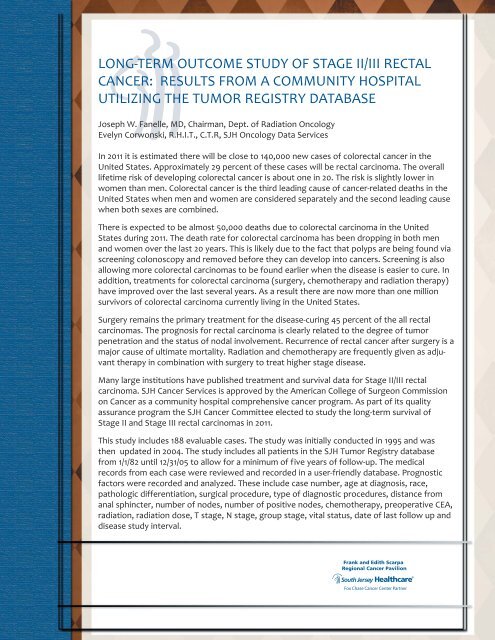2011 Cancer Annual Report (PDF) - Inspira Health Network
2011 Cancer Annual Report (PDF) - Inspira Health Network
2011 Cancer Annual Report (PDF) - Inspira Health Network
Create successful ePaper yourself
Turn your PDF publications into a flip-book with our unique Google optimized e-Paper software.
LONG-TERM OUTCOME STUDY OF STAGE II/III RECTAL<br />
CANCER: RESULTS FROM A COMMUNITY HOSPITAL<br />
UTILIZING THE TUMOR REGISTRY DATABASE<br />
Joseph W. Fanelle, MD, Chairman, Dept. of Radiation Oncology<br />
Evelyn Corwonski, R.H.I.T., C.T.R, SJH Oncology Data Services<br />
In <strong>2011</strong> it is estimated there will be close to 140,000 new cases of colorectal cancer in the<br />
United States. Approximately 29 percent of these cases will be rectal carcinoma. The overall<br />
lifetime risk of developing colorectal cancer is about one in 20. The risk is slightly lower in<br />
women than men. Colorectal cancer is the third leading cause of cancer-related deaths in the<br />
United States when men and women are considered separately and the second leading cause<br />
when both sexes are combined.<br />
There is expected to be almost 50,000 deaths due to colorectal carcinoma in the United<br />
States during <strong>2011</strong>. The death rate for colorectal carcinoma has been dropping in both men<br />
and women over the last 20 years. This is likely due to the fact that polyps are being found via<br />
screening colonoscopy and removed before they can develop into cancers. Screening is also<br />
allowing more colorectal carcinomas to be found earlier when the disease is easier to cure. In<br />
addition, treatments for colorectal carcinoma (surgery, chemotherapy and radiation therapy)<br />
have improved over the last several years. As a result there are now more than one million<br />
survivors of colorectal carcinoma currently living in the United States.<br />
Surgery remains the primary treatment for the disease-curing 45 percent of the all rectal<br />
carcinomas. The prognosis for rectal carcinoma is clearly related to the degree of tumor<br />
penetration and the status of nodal involvement. Recurrence of rectal cancer after surgery is a<br />
major cause of ultimate mortality. Radiation and chemotherapy are frequently given as adjuvant<br />
therapy in combination with surgery to treat higher stage disease.<br />
Many large institutions have published treatment and survival data for Stage II/III rectal<br />
carcinoma. SJH <strong>Cancer</strong> Services is approved by the American College of Surgeon Commission<br />
on <strong>Cancer</strong> as a community hospital comprehensive cancer program. As part of its quality<br />
assurance program the SJH <strong>Cancer</strong> Committee elected to study the long-term survival of<br />
Stage II and Stage III rectal carcinomas in <strong>2011</strong>.<br />
This study includes 188 evaluable cases. The study was initially conducted in 1995 and was<br />
then updated in 2004. The study includes all patients in the SJH Tumor Registry database<br />
from 1/1/82 until 12/31/05 to allow for a minimum of five years of follow-up. The medical<br />
records from each case were reviewed and recorded in a user-friendly database. Prognostic<br />
factors were recorded and analyzed. These include case number, age at diagnosis, race,<br />
pathologic differentiation, surgical procedure, type of diagnostic procedures, distance from<br />
anal sphincter, number of nodes, number of positive nodes, chemotherapy, preoperative CEA,<br />
radiation, radiation dose, T stage, N stage, group stage, vital status, date of last follow up and<br />
disease study interval.













